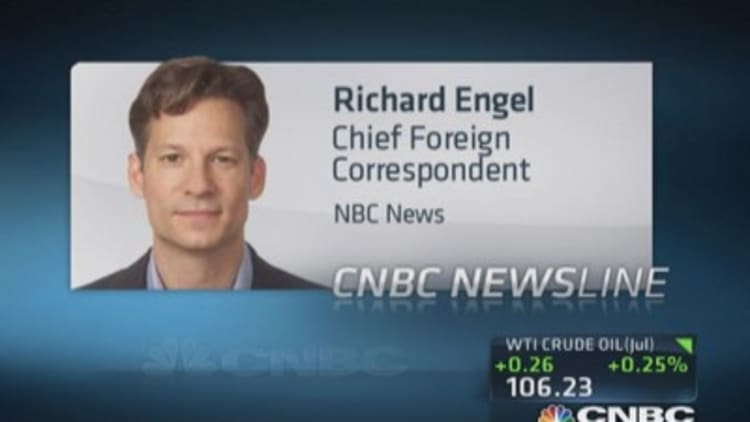Investors who want to understand the future direction of Iraq don't have many places to turn as the country's violent landscape shifts daily. But there's at least one solid indicator about the country's future—and it involves the political standing of one man.
Prime Minister Nouri al-Maliki is an immediate reference point for investors: If he manages to hold onto power, that probably means prolonged sectarian violence, experts told CNBC. But even if he leaves office, his replacement will indicate a lot as well.
Read MoreKerry in Cairo for talks over Iraq
Maliki's fate is by no means settled, but it appears increasingly likely that he's on his way out of office in the face of the offensive by the jihadist Islamic State of Iraq and Syria.
"Unless he is able to mount a major counteroffensive that retakes all the gains ISIS has made, his tenure as prime minister is limited," said Rick Brennan, a senior political scientist at RAND Corp. and a former senior civilian advisor to the U.S. military in Iraq. "If he can be successful and turn this around, then nobody can contest him, but at this point the betting is that somebody in the bowels of his party will emerge."
Iraqi officials said that Washington has sent private messages asking for Maliki to step down, but U.S. officials have not made any such declaration public, according to Reuters.
Two visions: US vs. Iran
The question of Maliki's replacement pits two different visions for Iraq against each other: On the one hand, the United States has indicated a desire for a leader who can work across sectarian lines to hold the country together. On the other, there's Iran, which experts say wants a Shiite leader who can act as its proxy in Iraq.
Read MoreIraq turmoil: The worst and best scenarios
The administration of President Barack Obama appears to be holding out hope for a coalition government that will include Shiite, Sunni and Kurdish elements. Such a goal is consistent with U.S. aims going back to the second Bush administration and the invasion of the country in 2003.

Obama said in a speech last week that "it's not the place for the United States to choose Iraq's leaders," but he indicated his hopes for a coalition government that would work to build consensus across the nation's different communities. Iraqis are due to organize a new government based on the results of an April election. Maliki's party won the greatest number of parliamentary seats in that vote, but it does not command an outright majority.
Read MoreMobius: It's not too late to invest in Russia, Iraq
Shiite Iran, however, has different ideas. The Islamic republic has put in a considerable amount of work in recent years to consolidate Maliki's control over Iraq's Shiite population, said Reva Bhalla, vice president of Global Analysis for geopolitical research firm Stratfor. With Maliki's uniting of Iraqi Shiites, Iran has hoped to exert more control over events in Baghdad.
Although "the personality is expendable" as far as Iran is concerned with Maliki, Tehran will have an interest in his successor being a strongly pro-Shiite politician more than Obama's hoped for consensus-builder, Bhalla said.
What it all could mean for oil
Consolidated political power will also be important for the future of Iraq's oil production.
As Kenneth Pollack, a senior fellow at the Brookings Institution and a former Iraq military analyst for the CIA, told CNBC last week, the cost of producing oil in Iraq's Shiite south depends in part on how successfully Baghdad is able to maintain order among the competing tribes in the region. If the central government's attention is largely spent on the war effort or infighting, then chaos can be expected to increase in the critical oil-rich areas of southern Iraq.
Stability in the south, which provides oil for export, is all the more important as chaos has already come to the country's largest oil refinery—located 120 miles north of Baghdad in Baiji. NBC News reported Tuesday that ISIS and Iraqi security forces continued to battle in Bajii despite insurgent claims that it had taken over the installation. The northern operations supply much of the country's domestic oil needs.

Adding to concerns about maintaining order, experts told CNBC that a distracted or divided government would further slow the already tedious bureaucratic permit process facing oil companies hoping to do business in Iraq—significantly affecting the projected growth of the industry.
"If you start to see a real breakdown of basic governance, it would be nearly impossible to have any kind of transparency or certainty around things like basic contracts," said Sam Ori, executive vice president of nonpartisan organization Securing America's Future Energy.
Read MoreIs this the end of Iraq?
Still, if Maliki either successfully reasserts control, or if a stable government of any sort takes his place, then oil production should hold up more or less on schedule, Ori said, adding that an old maxim remains truer than ever: "Everybody who has oil wants to sell it."
—By CNBC's Everett Rosenfeld


